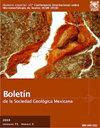Environmental variability during the last three millennia in the rain shadows of central Mexico
IF 0.4
4区 地球科学
Q4 GEOLOGY
引用次数: 2
Abstract
The last three millennia have been characterized by global temperature oscillations of around one Celsius degree, and high frequency variability on precipitation. Two main temperature anomalies have been reported worldwide, the Medieval Warm Period (MWP) and the Little Ice Age (LIA), characterized by higher and lower than average temperatures, respectively. Precipitation variability has been mostly associated with El Niño anomalies in the Equatorial Pacific. These global variability modes have been modulated by regional factors such as sea surface temperatures and their interaction with continental landmasses. Understanding regional responses to these anomalies would shed light on ecosystem response to environmental variability, a paramount tool for conservation purposes on the light of modern climate change. Here we present a 3,000-year sedimentary record from Lake Metztitlán, located in a Biosphere Reserve under the rain shadow of the Sierra Madre Oriental. Cladoceran and geochemical analyses were used to reconstruct lacustrine dynamics through the time period encompassed by the record. Our record points to highly dynamic lacustrine systems, coupled with global and regional climatic variability. In Metztitlán, the MWP was associated with low lake levels and a high torrentiality of the precipitation reflected in high-frequency peaks of detrital material. The LIA was associated with an enlarged water body, probably as a result of lower evapotranspiration. Overall, global climatic variability resulted in high variability of regional precipitation and detrital input in the Metztitlán region, in turn associated with changes in lake morphometry and depth. Our record highlights the vulnerability of the area to changes in sea surface temperature of the Gulf of Mexico, and to changes in the frequency of El Niño events. Although the effects of global climate change in the region are inescapable, our results emphasize the importance of controlling anthropogenic activities as an additional source of pressure on the regional ecosystems.墨西哥中部雨影中过去三千年的环境变化
过去三千年的特点是全球温度波动约一摄氏度,降水量变化频率高。据报道,世界范围内有两个主要的温度异常,即中世纪暖期(MWP)和小冰期(LIA),其特征分别是高于和低于平均温度。降水变化主要与赤道太平洋的厄尔尼诺异常有关。这些全球变化模式受到区域因素的调节,如海面温度及其与大陆陆地的相互作用。了解区域对这些异常现象的反应将有助于了解生态系统对环境变化的反应,这是根据现代气候变化进行保护的重要工具。在这里,我们展示了Metztitlán湖3000年的沉积记录,该湖位于马德雷山脉(Sierra Madre Oriental)雨影下的生物圈保护区。枝角类和地球化学分析用于重建记录所涵盖的整个时期的湖泊动力学。我们的记录表明,湖泊系统高度动态,加上全球和区域气候变化。在Metztitlán,MWP与低湖水位和碎屑物质高频峰所反映的高降水量有关。LIA与水体增大有关,可能是蒸散量降低的结果。总体而言,全球气候变化导致Metztitlán地区的区域降水和碎屑输入具有高度可变性,进而与湖泊形态计量和深度的变化有关。我们的记录突出表明,该地区易受墨西哥湾海面温度变化和厄尔尼诺事件频率变化的影响。尽管全球气候变化对该地区的影响是不可避免的,但我们的研究结果强调了控制人为活动的重要性,这是对该地区生态系统造成额外压力的来源。
本文章由计算机程序翻译,如有差异,请以英文原文为准。
求助全文
约1分钟内获得全文
求助全文
来源期刊
CiteScore
1.40
自引率
12.50%
发文量
34
审稿时长
50 weeks
期刊介绍:
The Boletín de la Sociedad Geológica Mexicana is a completely free-access electronic journal published semi-annually that publishes papers and technical notes with its main objective to contribute to an understanding of the geology of Mexico, of its neighbor areas, and of geologically similar areas anywhere on Earth’s crust. Geology has no boundaries so we may publish papers on any area of knowledge that is interesting to our readers.
We also favor the publication of papers on relatively unfamiliar subjects and objectives in mainstream journals, e.g., papers devoted to new methodologies or their improvement, and areas of knowledge that in the past had relatively little attention paid them in Mexican journals, such as urban geology, water management, environmental geology, and ore deposits, among others. Mexico is a land of volcanos, earthquakes, vast resources in minerals and petroleum, and a shortage of water. Consequently, these topics should certainly be of major interest to our readers, our Society, and society in general. Furthermore, the Boletín has been published since 1904; that makes it one of the oldest scientific journals currently active in Mexico and, most notably, its entire contents, from the first issue on, are available online.

 求助内容:
求助内容: 应助结果提醒方式:
应助结果提醒方式:


